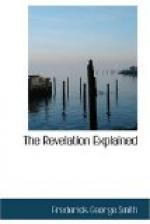Armageddon, where the spirits gathered all the enemies of truth and righteousness together, means the mountain of Megiddo, the memorable field of the overthrow of Sisera’s mighty host by Barak. It was also the place of great defeat to the Israelites in the time of Josiah and the scene of his death. The name, therefore, stands as a symbol for a field of slaughter or defeat and denotes that when the confederation of wickedness is complete, the united host of God’s enemies will be utterly defeated, as by the overthrow of Megiddo. This great conflict with powers of wickedness and spirits infernal will be further explained in chapter XX.
Simultaneous with the notable events of this vial, the announcement is made of the near-coming of Christ to the world—“Behold I come as a thief. Blessed is he that watcheth, and keepeth his garments, lest he walk naked, and they see his shame.” The children of God that have been gathered out of old Babylon rejoice in the glad announcement and say, “Even so come, Lord Jesus.”
17. And the seventh angel
poured out his vial into the air; and
there came a great voice out
of the temple of heaven, from the
throne, saying, It is done.
18. And there were voices,
and thunders, and lightnings; and
there was a great earthquake,
such as was not since men were
upon the earth, so mighty
an earthquake, and so great.
19. And the great city was divided into three parts, and the cities of the nations fell: and great Babylon came in remembrance before God, to give unto her the cup of the wine of the fierceness of his wrath.
20. And every island
fled away, and the mountains were not
found.
21. And there fell upon men a great hail out of heaven, every stone about the weight of a talent: and men blasphemed God because of the plague of the hail; for the plague thereof was exceeding great.
The application of this vial to the judgments of the last great day is so plain that but little comment is here necessary. It was poured “into the air,” a region of vast extent, not confined to a given locality, but embracing the whole earth. Hence this plague is universal. When the seventh angel emptied his vial, “There came a great voice out of the temple of heaven, from the throne, saying, It is done.” All is now fulfilled. The work of wrath is finished. The description of the plague follows, but it follows only as a description. As actually accomplished, it preceded that great voice, which was uttered in view of the thing already brought to pass.




